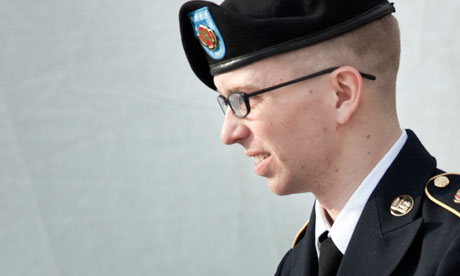 Gone are the days of the all-American army hero. These days, the US military is more like a sanctuary for racists, gang members and the chronically unfit.
Gone are the days of the all-American army hero. These days, the US military is more like a sanctuary for racists, gang members and the chronically unfit.
The three most common barriers for potential recruits were failure to graduate high school, a criminal record and physical fitness issues, including obesity. The criminal record had been dealt with by "moral waivers" and the obesity problem by "medical waivers", but dropping the standards on educational attainment would not be so easy without seriously affecting operational readiness. There was a way for non-graduates to get into the military, however: the general equivalency degree, or GED, which can afford recruits a waiver if they score well enough on the military's entrance exam. The army accepts about 15% of recruits without a high school diploma if they have a GED. Alive to this loophole, the military instituted another program in 2008, the so-called GED Plus, to give more of America's youth the requisite qualifications they needed to go and fight. It opened its first prep school for the purpose, targeted at tough, inner-city areas.


 Military Glance
Military Glance The civilian lawyer of Bradley Manning, the US soldier suspected of transferring hundreds of thousands of state secrets to WikiLeaks, is demanding that at least seven years be lopped off any sentence he might be given on grounds that he was improperly treated while in military custody.
The civilian lawyer of Bradley Manning, the US soldier suspected of transferring hundreds of thousands of state secrets to WikiLeaks, is demanding that at least seven years be lopped off any sentence he might be given on grounds that he was improperly treated while in military custody. Gone are the days of the all-American army hero. These days, the US military is more like a sanctuary for racists, gang members and the chronically unfit.
Gone are the days of the all-American army hero. These days, the US military is more like a sanctuary for racists, gang members and the chronically unfit. Six US army soldiers and three marines escaped criminal charges but received administrative punishments for mistakenly burning Qur'ans and urinating on the corpses of Taliban insurgents in Afghanistan, US military officials said Monday.
Six US army soldiers and three marines escaped criminal charges but received administrative punishments for mistakenly burning Qur'ans and urinating on the corpses of Taliban insurgents in Afghanistan, US military officials said Monday. Gwenyth Todd had worked in a lot of places in Washington where powerful men didn’t hesitate to use sharp elbows. She had been a Middle East expert for the National Security Council in the Clinton administration. She had worked in the office of Defense Secretary Dick Cheney in the first Bush administration, where neoconservative hawks first began planning to overthrow Iraqi dictator Saddam Hussein.
Gwenyth Todd had worked in a lot of places in Washington where powerful men didn’t hesitate to use sharp elbows. She had been a Middle East expert for the National Security Council in the Clinton administration. She had worked in the office of Defense Secretary Dick Cheney in the first Bush administration, where neoconservative hawks first began planning to overthrow Iraqi dictator Saddam Hussein. ‘If someone uses the uniform, whatever uniform it is, for partisan politics, I’m disappointed by that,’ Gen. Dempsey says. Group slams Obama for taking credit for killing Osama bin Laden.
‘If someone uses the uniform, whatever uniform it is, for partisan politics, I’m disappointed by that,’ Gen. Dempsey says. Group slams Obama for taking credit for killing Osama bin Laden. They call it "rahowa" - short for racial holy war - and they are preparing for it by joining the ranks of the world's fiercest fighting machine, the U.S. military.
They call it "rahowa" - short for racial holy war - and they are preparing for it by joining the ranks of the world's fiercest fighting machine, the U.S. military.






























